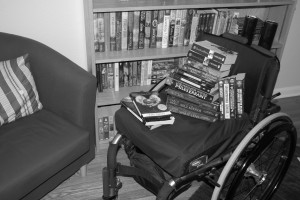"Just Happen to be Disabled"
 I see requests all the time for books about characters with disabilities where the disability is not the main conflict, characters that “just happen to be disabled”. The thing is, I understand where this is coming from. I talked about it last week. People with disabilities are first and foremost just people. Our struggles are not the most important – and certainly not the only – things about us. But we still want them acknowledged. We want to be “normal” and normal requires representation, doesn’t it? No one will recognize us as normal without first recognizing us.
But to be completely honest with ourselves, disability tends to be pervasive. I mean, it’s exceptionally hard to define, but I believe a major part of disability is it changes your life. As okay as I am, as much as I’ve accepted my limitations, the truth is, I would live differently if I could walk better. No chair, no crutches. Those are obvious, but there are others, too. No constant low-level anxiety about how I’m going to get out of this folding chair. No putting my back to a wall so I don’t have to worry about being jostled from behind. No blog about disabilities in fiction, and no writing fairytale heroes in wheelchairs. Life would be different.
I see requests all the time for books about characters with disabilities where the disability is not the main conflict, characters that “just happen to be disabled”. The thing is, I understand where this is coming from. I talked about it last week. People with disabilities are first and foremost just people. Our struggles are not the most important – and certainly not the only – things about us. But we still want them acknowledged. We want to be “normal” and normal requires representation, doesn’t it? No one will recognize us as normal without first recognizing us.
But to be completely honest with ourselves, disability tends to be pervasive. I mean, it’s exceptionally hard to define, but I believe a major part of disability is it changes your life. As okay as I am, as much as I’ve accepted my limitations, the truth is, I would live differently if I could walk better. No chair, no crutches. Those are obvious, but there are others, too. No constant low-level anxiety about how I’m going to get out of this folding chair. No putting my back to a wall so I don’t have to worry about being jostled from behind. No blog about disabilities in fiction, and no writing fairytale heroes in wheelchairs. Life would be different.
Then what’s the difference? Why do we read about certain characters and cringe at their portrayal? What does it mean that they “just happen to be disabled?” If it means that a character should be a person first, then I agree. But if they’re saying they want to see a character that’s in a wheelchair and the chair doesn’t play any part in the main conflict or the character’s arc, then I feel like that’s unrealistic.
A disability is going to affect the way a character thinks, feels, and reacts. The same way their race or socioeconomic class would. We’re taught to take these things into account about the characters we create so why would one who’s disabled be any different. It may not be the main conflict (and honestly, I’m struggling to figure out exactly what that means), but it’s going to affect it. Just as much as it will affect the character’s arc. No matter how hard you try to write the book so it’s “not a big deal”, if you’ve done it right and the disability feels real, then it’s still going to feel like a big deal because it’s always there.
So in the end, it’s a balancing act. How do you recognize the life changes and still write a character who is a person first and disabled second? Especially when that second begins to feel like a pretty big first.
The questions I’m starting to ask myself while I write are:
- Are they more than their disability? Disabled characters are going to have quirks and flaws and strengths unrelated to their disability, just like every other character in the book.
- Are they more than one detail deep? No character should be limited to one characteristic, just as no disability is defined as one trope or stereotype. An author loses a lot of points by repeating the same detail over and over again as if that makes the disability more real. We got it, she needs help going to bathroom. You’ve beat that dead horse to death.
- Do they have heroic qualities above and beyond their ability to adapt? Yeah, sure being adaptable is a good thing, but when left with no other options, most people will bend before they break. I want to see the heroic qualities of Aragorn or Luke Skywalker in a character with a disability.
- And my least favorite, are they healed at the end of the book? This is just plain insulting and unrealistic and damaging to all people with disabilities everywhere. By healing a character of their disability, an author is saying, “There’s something wrong with you that needs fixing.”
These are my questions. What are yours? I’m realizing that everyone is going to read my books differently. I cannot please everyone, but I can’t enrage everyone either. All I can do is write my characters with as much reality as possible. They will have strengths, and flaws, and they will have disabilities.
